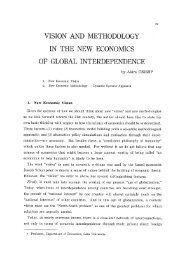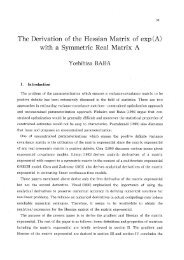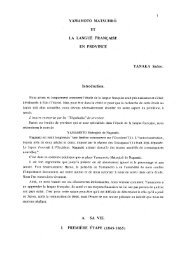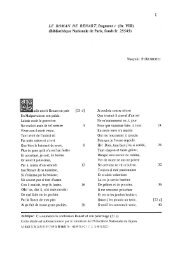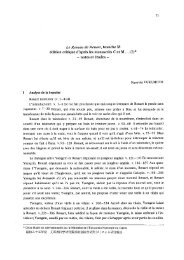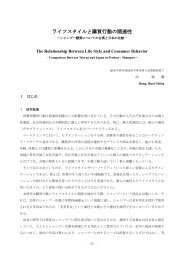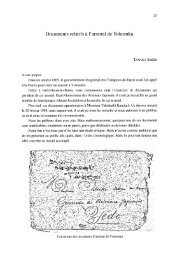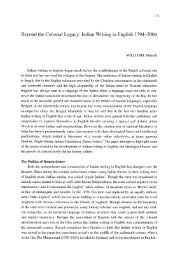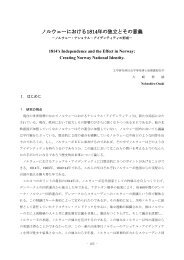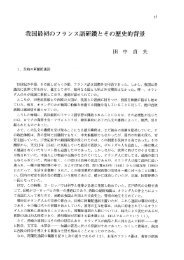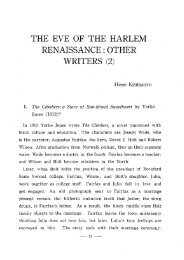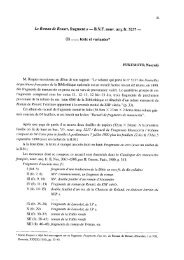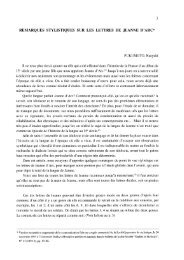New Historicism and Literary Studies - Soka University Repository
New Historicism and Literary Studies - Soka University Repository
New Historicism and Literary Studies - Soka University Repository
You also want an ePaper? Increase the reach of your titles
YUMPU automatically turns print PDFs into web optimized ePapers that Google loves.
You see, if there was no resistance, there would be no power relations. Because it<br />
would simply be a matter of obedience. You have to use power relations to refer to the<br />
situation where you're not doing what you want. So resistance comes first, <strong>and</strong> resistance<br />
remains superior to the forces of the process; power relations are obliged to change with<br />
the resistance. So I think that resistance is the main word, the key word, in this dynamic.77<br />
Foucault argues against the position of individual entrapment in the politics of power; as the<br />
individual always possesses the power to resist. Foucault, therefore, does not endorse the<br />
containment-subversion paradigm of power, but provides a more complex argument for both<br />
the forces of status quo containment <strong>and</strong> individual subversion or resistance.<br />
Raymond Williams in Marxism <strong>and</strong> Literature addresses the problem of ideology by<br />
introducing heterogenous <strong>and</strong> shifting ideological "movements <strong>and</strong> tendencies both within <strong>and</strong><br />
beyond a specific <strong>and</strong> effective dominance."78 The constantly shifting <strong>and</strong> redefining nature of<br />
"movements <strong>and</strong> tendencies" against dominant ideologies <strong>and</strong> against themselves provide an<br />
ideological ground for both contestation <strong>and</strong> redefinition. Dominant ideologies are maintained<br />
by a grouping of gender, ethnicity, class, profession or age that individuals use as cultural<br />
producers; they are also maintained by the consumers or resisters of cultural production<br />
(readers/resisters) <strong>and</strong> by the autonomy of the cultural medium. Williams explains that<br />
"hegemony" as a concept goes beyond culture <strong>and</strong> encompasses a "whole social process,"<br />
including ideology. He argues: "To say that `men' define <strong>and</strong> shape their whole lives is true<br />
only in abstraction. In any actual society there are specific inequalities in means <strong>and</strong> therefore<br />
in means to realize this process."79 Williams explains that specific cultures overwhelm the<br />
individual to the extent that he cannot think or act in specific historical situations. And this<br />
Marxist position challenges the basic premise of American cultural anthropology that<br />
individual agencies possess the ability to act upon <strong>and</strong> change historical situations.8° An<br />
acceptable model of culture must employ the methodology of cultural poetics to incorporate<br />
both the dominant <strong>and</strong> subordinate ideologies that give rise to identity <strong>and</strong> difference. Williams<br />
explains:<br />
Essentially, all three agencies—production, consumption/appropriation <strong>and</strong><br />
reproduction—are involved in the ideologies of dominance, transforming <strong>and</strong> getting<br />
transformed in the process. A dynamic model of culture involves a constant interplay of<br />
dominant <strong>and</strong> subordinate ideological positions that create identity <strong>and</strong> difference in an<br />
ever-shifting paradigm of cultural poetics?'<br />
In recent years cultural politics has tried to unravel the supposedly hidden text in writers<br />
such as Shakespeare, a text subversive of its own canonicity. The notion that subversion is<br />
cl<strong>and</strong>estinely woven in the very fabric of texts might seem maliciously historical, but it is more<br />
formal than historical in practice. Jonathan Dollimore finds the notion of a cl<strong>and</strong>estine<br />
subversion in texts of famous canonical writers somewhat ludicrous. In the Introduction to<br />
Political Shakespeare: Essays in Cultural Materialism he argues,<br />
Nothing can be intrinsically or essentially subversive in the sense that prior to the<br />
135



